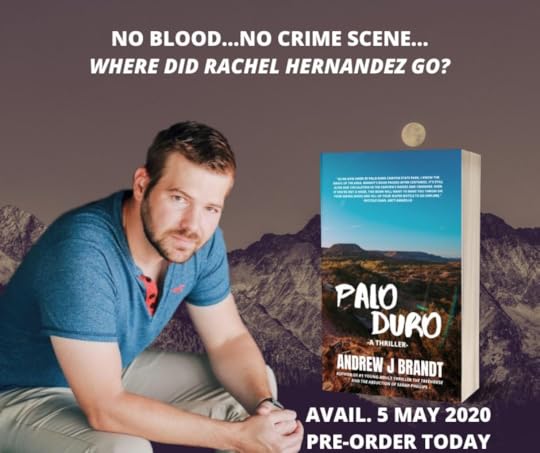Andrew J. Brandt's Blog
December 5, 2022
Why I've Stopped Buying Books

There are few places that I frequent more often than the bookstore. At least once a week, I like to take a trip to one of my local bookstores to peruse the new releases, the hardbacks, the paperbacks. Maybe even take a nostalgic trip to my childhood and stroll through the Star Wars aisle. Hundreds of dollars spent by stacking books in my hands and taking them to the checkout counter, where I would then take them home, place them on my shelves and promise myself that I would read them all—eventually.
Now, I am biased. It is important to me, as someone who makes a living by making things up and writing them down, for people to buy books. To go to the bookstore, to purchase books (preferably book written by me), to share them with their friends who will then go out and buy more. And I am just as biased as a reader. I love to read new books, to discover new writers, to find a new favorite.
But here's the thing: I have often found myself buying books just for the sake of buying them. And, sure, there is a definite enjoyment in buying books and reading them—you could even say that those two acts (reading books and buying books) are wholly separate hobbies. So what happens to those books? Some of them are read. Some are placed on the bookshelves. Some find a new home in our Little Free Library. But many are forgotten, gathering dust, sworn to someday be read. Which, I feel is a sad existence for a piece of art that an author spent countless hours creating. It's a sad fate that I am not proud to have forced upon too many books.
So, I've stopped buying books*. But that doesn't mean I've stopped reading. Instead, I have been taking advantage more and more of my local library. The Amarillo Public Library is an incredible resource for readers, offering new releases, popular reads and of course a backlist of almost anything you could think of. Feeling like going through Michael Crichton's bibliography? They have it. On a John Green kick? Get 'em all. And if they don't have it in their shelves, they'll find it for you through interlibrary loan. There is something magical about going into the library and losing yourself in the stacks and rows of books with no expectation of spending money. Fill your tote, check out, read them and take them back when you're done. It's so easy.
And you're probably thinking—Andrew, you're an author. If people get your books for free from the public library, doesn't that mean you're not making money from those sales?
The answer is: you're right. Every time a reader borrows a book from the library, the author does not see money from a sale. I only make money once—from when the library purchases the book. But it is so much more important to me for someone to discover my books through the public library than not at all. And maybe that new reader will come to a book signing event, will be able to have a one-on-one interaction. That is worth more than any sticker price.
So, that's why I've stopped buying books. At least stopped buying books* for myself. I still purchase books all the time, mostly to put in our Little Free Library or to share with friends. Both keeping my shelves from being overcrowded with good intentions, but also because I am currently enjoying supporting my local library.
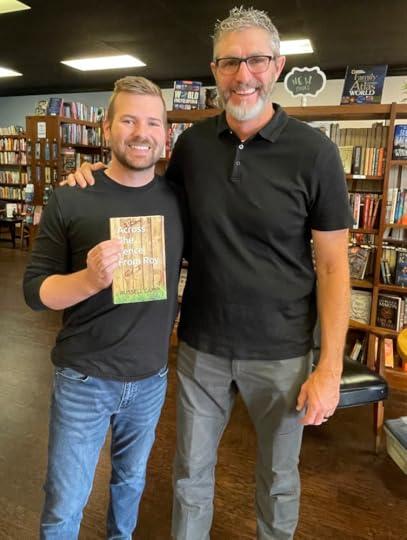
As you've probably noticed, there are a few asterisks scattered through this post. That's because I do still buy books, but with a corollary—if it's a friend's new release and/or if it's autographed. I love supporting my author friends and anytime they have a new release, I always want to be first in line for the autographed copy. My bookshelves these days are full of signed books from my friends, and I will always support them with my social media and my dollars. Plus, what makes a better gift than an author-signed copy of a great book??
May 5, 2022
Book Review: Black Bear Lake by Leslie Liautaud
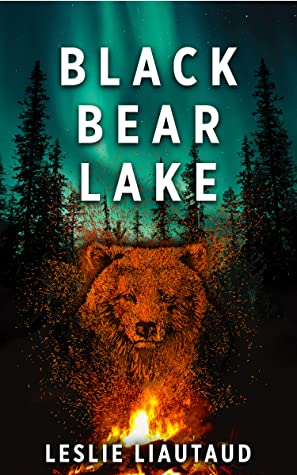
Thank you Leslie Liautaud and Blue Handle Publishing for the ARC of Black Bear Lake.
It took me a few days after finishing this novel to sit down to write my review for this YA coming-of-age novel because it has been haunting my thoughts ever since I finished it.
First, the writing. Told in first-person, the novel follows a young man named Adam—first, as an adult, and later, as a teenager as he reflects on the last summer he spent at his family's summer vacation destination, Black Bear Lake.
There is so much to love about this heartbreaking and hauntingly beautiful novel. The prose breathes with descriptions of the lake without getting bogged down in being too flourishing. Leslie flexes her muscles most when delving into inter-family drama and the emotions that Adam and Dannie (his best friend and cousin) wade through.
When I finished this novel, I was on a plane to Charleston, SC. Apparently I was crying harder than I thought I was because the woman across the aisle asked if I was alright and if I was afraid of planes.
So, crying on an airplane is the highest praise I can offer. Black Bear Lake is a five-star read and belongs at the top of your TBR pile.
December 1, 2021
Join my ARC Team!

My next book is on the horizon, and I want to give YOU the first chance to read it. That's why I'm starting an ARC Team. Which means YOU get a FREE copy of the book to read, to share and to review.
For authors, ARC Teams can make or break a book. By reviewing, sharing and "getting the word out," ARC Teams and the readers involved can help show the marketability and engagement an author has, as well as the anticipation of a new release. Bookstores look for that kind of engagement so they know how many copies of a book to order to put on the shelves.
And the best part? It's free! There's no fee for signing up, no fee for getting an advanced copy of the book. (The only caveat is, you may be required to spend money on postage to send the book to the next person on the ARC Team List — about $3.) Your only job is to read it, review it on review sites, post about it on social media and then send the book to the next person on the list.
To get started, click on this link and fill out the Google Form or click the button below. I can't wait to share this book with you all, and I can't wait to see all the ways you share it with the world.
Cheerfully,

Andrew J Brandt
November 22, 2021
Top 10 Books of 2021 - Part 2
Last week, I shared the first part of this list, my favorite books of 2021. Again, this list is purely subjective and may not properly highlight many of your favorite or popular releases over the past year. Though there were a ton of amazing novels released over 2021, this list is simply the ones that stuck out to me and my personal tastes.
Also, by clicking on either the book title or the cover image with each listing, you will be taken to each one's bookshop.org listing. Bookshop.org is an online bookstore with a mission to financially support local and independent bookstores like Burrowing Owl. They also have an affiliate program which pays affiliates (like me!) 10% commission on any book sale made through the site.
Also, also: I ran a contest over on Facebook for a signed, rare copy of The Unwinding Cable Car as well as some extra goodies. And the winner is...after the list.
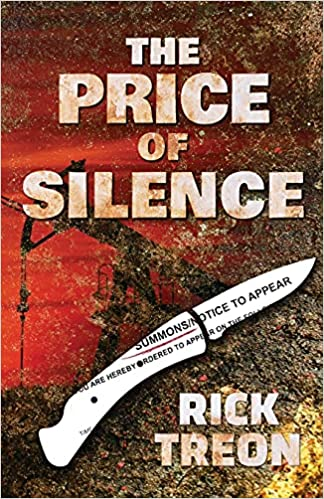
5. The Price of Silence by Rick Treon
Rick released two novels this year, but this sequel to Let the Guilty Pay, which was one of my favorite books of 2020, was the one to make this list just because I was impatiently waiting for him to finally release it. The Price of Silence follows our protagonist/antihero from LtGP, “true”-crime writer (if you’ve not read either book, you need to in order to understand why true is in quotations) Bartholomew Beck after the events of that first novel where he had to clear his name in a recent murder case — a murder case that, incidentally, mirrors one from two decades ago. The same murder case that he wrote about and made him a literary star. Also, Beck may not be telling the truth about a lot of things. It makes the character both incredibly frustrating and so compelling. You want to continue reading to see how he weasels his way out of these situations. Beck, though the protagonist, though the main character, is not a good guy. But that’s what makes Treon’s books such page-turners. There’s a reason he’s an award-winner, and The Price of Silence is a top-notch crime thriller.
4. Part of Your World by Abby Jimenez
Okay, technically this one doesn’t come out til 2022, but Abby sent me an early review copy, which I devoured in about forty-eight hours.
At this point, the bar is set so high you almost have to wonder if Abby — coming off her New York Times bestseller Life's Too Short — can continue the upward trajectory. If perhaps she'll run out of gas.
But, no. If anything, Abby proves with Part of Your World that there is no ceiling when it comes to her work. That her stories transcend typical rom-coms to something universally understood about life, love and the happy-ever-after — that real life is dirty, messy, shaped by our choices.
In Part of Your World, we get to meet sweet small-town Daniel, the twenty-eight-year-old "mayor" of Wakan, a tourist town that all but shuts down in the offseason. He helps everyone around him without expecting anything in return because that's how things are done in Wakan, and that's how things have been done in his family for five generations.
We also are introduced to Alexis, successful in her own right, though she may never live up to the renown of her name. The Montgomerys have been world-renowned doctors for generations, and she and her brother were both molded to continue the tradition.
It's with these two characters and their meeting that we get this other-side-of-the-tracks romance. Daniel and Alexis come from completely different worlds, but they find a comfort and a peace in each other.
It's an HEA, so you know how it turns out, but I think this is the most enjoyable "journey" of romance that Abby has written thus far. It's fun, it's sweet, there are a ton of ancillary characters who add complexity to the story. But Abby really tackles head-on abuse in relationships, whether it's physical or emotional, and how that abuse can be generational.
Once again, Abby made me ugly-cry with a heartfelt and honest romance.
3. You Know It’s Love by Jen Morris
Jen Morris does romance and banter better than any other witty romance novelist out there. Like Rick, she had a couple of releases in 2021, but You Know It’s Love is not only my favorite, but it was also one of my favorite romance novels period. I read this over two days, and absolutely fell in love with Cat and Myles and their budding romance. Morris gives her characters real issues to overcome, which makes that HEA ending so, so magical. She’s got three books in this series out, with the third (and most recent) Outrageously in Love pretty much a lock on my 2022 list.
2. The Siren by Katherine St. John
If anyone feared that St. John would have a sophomore slump after her meteoric debut The Lion’s Den (one of my Top 10 books of 2020), you should be happy to know that that’s not the case with THE SIREN.Weaving multiple POVs and multiple timelines, with the ticking timebomb of a threatening hurricane, the bulk of THE SIREN takes place on a movie set shooting in the Caribbean. Which means lots of sun, bikinis and sex. Oh, and murder.This is a fantastic thriller and the climax moves at breakneck pace. I could not put it down once I hit those final 100 pages.If anything, THE SIREN proves that Katherine St. John isn’t just a talented storyteller — she’s a master of the art.
1. A Bright Ray of Darkness by Ethan Hawke
The best book I’ve read this year, hands down, is Ethan Hawke’s — yes, that Ethan Hawke — latest. Which, when reading the synopsis — married actor caught cheating on his wife must face his infidelities and grow up, all while starring as Hotspur in a Broadway production of King Henry IV — you may scratch your head. Finally, a novel about the trials and tribulations of a rich, white guy! What could pull at the heartstrings of a beleaguered nation tighter than a story of brief, emotional setback of a good-looking actor? But look. It really is that damn good. Hawke, being known as the guy who cheated on Uma Thurman and then his meteoric embarrassment afterward, takes that experience and crafts an incredibly human story that explores the delusions of manhood with uncanny nerve and insight. I read it twice this year and shared it with my book club. A Bright Ray of Darkness is raw, unfiltered and has quickly found itself at the top of the list of books I recommend to my friends.
AND...congratulations to Charlie Collins! You have won the signed book prize package. Email andrew@writerbandt.com with your mailing address so we can get your book and prizes to you. And thank you to everyone who signed up.
November 15, 2021
Top 10 Books of 2021 - Part 1
This list is purely and completely subjective to not only my own tastes as a reader, but also simply what I was subjected to during this last year. My biggest fear is that I have somehow missed something huge that came out throughout the previous year, and I was too stuck in my own lane, with my head down, to notice it. That said, even though this is my list, it’s also a welcome mat, a call-to-arms, an opening to a dialogue. I want to know what are the best things you’ve read this year, and what I should look for in the coming year.
Also, I have split this list into two separate posts, so in this one you get 10-6.
Also, also: Click on either the title or the book cover to take you to a Bookshop.org listing for each one. Bookshop.org is an online bookstore with a mission to financially support local and independent bookstores like Burrowing Owl. They also have an affiliate program which pays affiliates (like me!) 10% commission on any book sale made through the site.
Without further ado, here is my list: the 10 best books of 2021, according to me.
10. Later by Stephen King (Released 2 March 2021)
Later is the first of two releases this year by Mr. King, and it’s the shorter of the two. Released under the Hard Case Crime banner, the book has some crime elements, but it’s very much a horror novel. In Later, we follow Jamie Conklin, a teenager who wants very much to be normal, except for one thing: he can see ghosts. And they, in return, can see him. When his mother, who is a literary agent for a huge-name author. When said author dies, Jamie has to communicate with the dead author so his mother can write the final novel and save them from financial ruin. The book is a mish-mash of several different genres, and reads a lot like Holden Caulfield-meets-The Sixth Sense. Nonetheless, at 250 pages, it was a brisk, exigent read and a great entry into King’s oeuvre.
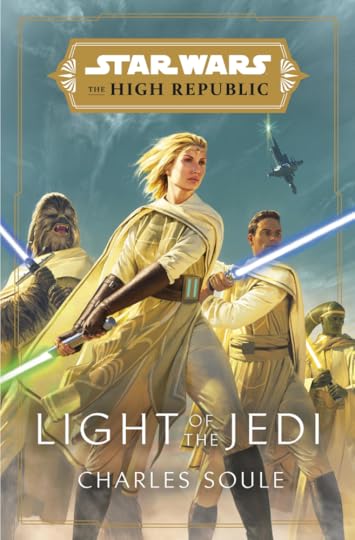
9. Star Wars: The High Republic – Light of the Jedi by Charles Soule (Released 5 Jan 2021)
This is the book to kick off a new era in Star Wars storytelling, and it does so in a fresh and exciting way. Charles Soule starts the novel — and the era — not with a superweapon that is common in this universe, but a catastrophe: when a passenger ship breaks apart in hyperspace, its remnants begin raining down on unsuspecting planets, putting the lives of billions at risk. In come the Jedi, the guardians of peace and justice in the Galactic Republic, to rescue those in the path of the ship’s remnants. Taking place 200 years before Luke Skywalker blew up the Death Star, this is an era in the history of the Star Wars galaxy that hasn’t had its story told yet, and Soule does an incredible job of balancing dozens of characters to set up this project. We get space pirates, Jedi, and a new and original bad guy (that isn’t a Sith Lord!) All in all, it’s refreshing and fun and reminded me of why I fell in love with Star Wars as a kid.
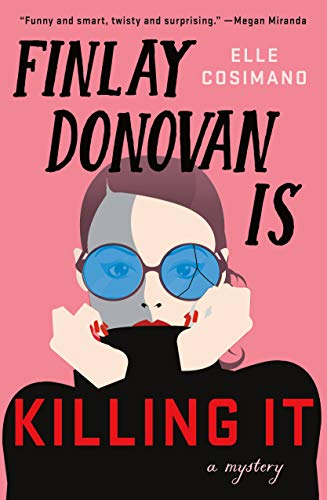
8. Finlay Donovan is Killing It by Elle Cosimano (Released 2 Feb 2021)
This mystery novel about a struggling and newly-single author Finlay Donovan is both hilarious and hair-raising. The hijinks — like sending her four-year-old to school with hair duct-taped to her head — and the mysteries kept me turning the page to see how it all would end. When Finlay is overheard discussing her next novel with her agent, she’s mistaken as a contract killer. Desperate for money, she looks into the job and gets caught up in things that are way over her head. With the help of her kids’ babysitter, Vero, Finlay has to weave through a world of dead guys, hot cops and the Russian mob — all while making sure her next novel is sent off in time! Elle Cosimano is great at mixing exigency with humor, and there were so many times that I couldn’t stop laughing, while at the same time shaking my head, wondering how Finlay Donovan would survive or stay out of jail. I’ve already read the next book in the series, due out in 2022, and I can say that Finlay Donovan may not be killing it — but Elle Cosimano definitely is!
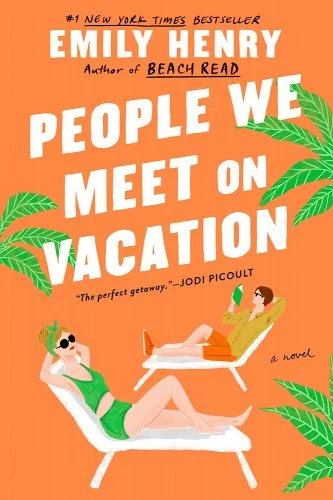
7. People We Meet on Vacation by Emily Henry (Released 11 May 2021)
Emily Henry’s 2021 release is the first romance novel on my list, and was such a joy to read. Like a wine spritzer on a warm summer evening, it was sweet, bubbly and I wanted more. The novel follows Poppy and Alex. They have nothing in common. She’s wild and carefree, he’s a khaki-wearing bookworm. Somehow, when they met in college, sharing a ride home for the holidays, they hit it off, and are now best of friends. For most of the year they live apart, but every summer, for the last decade, they get back together to take a glorious one-week vacation together. Except, two years ago, when they ruined everything and haven’t spoken since. Stuck in a rut, Poppy hits up Alex and convinces him to take one last awesome vacation together — and Poppy has one week to fix everything and get her best friend back.
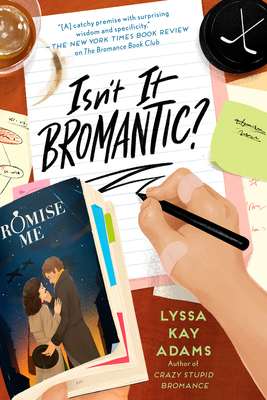
6. Isn’t It Bromantic? by Lyssa Kay Adams (Released 20 July 2021)
Romance book number 2! The fourth Bromance Book Club book had me absolutely in tears — both from the humor and from the romantic plot. Adams is firing on all cylinders with this series, and each one gets better and better as we explore the love lives of the guys in the Bromance Book club. The secret book club is made up of a bunch of guys who read romance novels in order to be better men, lovers and communicators, and I love some of the meta conversations the guys have when discussing both the books and love in general. This novel follows Vlad, one of the ancilliary characters in the first three books, in his first starring role in the series. Also known as the Russian, Vlad is a hockey player who has to woo back his wife. Also, there may be a speakeasy of nothing but cheese. A cheesy speakeasy. A speakcheesy. Full of love, laughs and that happy-ever-after (“We run for grand gesture!”) I couldn’t get enough.
October 20, 2021
Deleted Scene from THE UNWINDING CABLE CAR
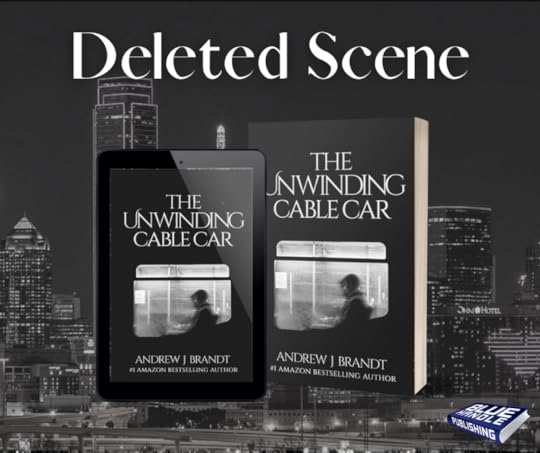
When I wrote The Unwinding Cable Car during the winter/spring of 2020, I was really trying to stretch my writerly muscles, to do some things narratively that I hadn't done yet. It was a more mature story, and I worked with some supernatural elements that I'd begun toying with in IN THE FOG. In Unwinding, the supernatural was intertwined with Hamilton's character. It wasn't a plot device, it was part of him.
With the anniversary of the book's publication a few weeks away, I thought I'd share a deleted scene from the novel's first draft. The scene in question revolved around a young New Yorker named Hattie who was the one to discover the dead flight attendant. Her death was the thing that really started to unravel Hamilton. When I turned the book in to Brandon, he loved the story but felt this scene took us (the reader) away from the main narrative. I hated to do it, but we cut Hattie's scene.
So, here it is. A little look into the process, a look into what gets cut from first draft to final product.
Eighteen hundred miles away from the highway where Hamilton drove to his sister’s house for Thanksgiving dinner, the streets of Tribeca were mostly deserted with the city’s attention on Manhattan and the Thanksgiving parade that marched down Sixth Avenue toward Herald Square.
Hattie McManus had lived in the neighborhood as long as she’d been alive, seeing the people and places evolve, the mood of the place had changed around her. She grew up playing on the playground at Washington Market Park. She was in high school when the 9/11 attacks rocked the city, the dust and debris floating through the air around Hudson River Park.
Despite the anxiety and panic, the rise and fall and rise again of crime around the neighborhood, her family had stayed. She was the single child of two artists, her father a playwright, her mother an actress. They’d met in the eighties, their love of theatre their own common interest, outside of Hattie.
Her senior year, they’d split up, with her father moving across town, closer to Broadway. She and her mother stayed in the apartment by the park she’d grown up in. She still had a scar on her right knee from a fall from the jungle gym that netted a dozen stitches when she was eight years old.
Hattie was helping her mother prepare the Thanksgiving meal when she’d gone down to the alleyway behind the apartment with a white plastic bag stretching at the seams. It amazed her how much garbage two women could produce just cooking a turkey and all the trimmings.
With the trash bag slung over her shoulder, the morning air hit her in the face, cold and crisp. November in the city was something she never enjoyed, and it meant the days would start getting shorter, the sun setting around five in the evening. For someone whose entire dream was to live somewhere where it was warm all year round, this Thanksgiving cold was the harbinger of winter.
Granted, she wasn’t too blasé about winter. Thanksgiving meant Christmas would soon come. However, after Christmas, winter served no purpose to Hattie. Just cold days and colder nights and the occasional norther that would rip through the city, keeping she and her mother holed up in the apartment for days, the radiator stuttering to life. Hattie wondered how many more years that old thing had left in it.
She also wondered how much longer her mother would be around. She’d become frail in her late fifties, losing weight to the point that she looked like a skeleton. An appointment to the doctor—which led to more appointments and multiple examinations—confirmed the worst.
Her mother was strong and wouldn’t let the cancer take her without a fight. Even now, upstairs cooking their Thanksgiving meal, the woman could just as easily be in bed trying to relieve her pain with medications. But, it was their favorite holiday and nothing was going to stop them from celebrating.
Hattie tried not to think about it, but she did; she wondered how many more favorite holidays they’d get to spend together.
And once her mother was gone, where would she go? Where would she take herself to start over? Or, rather, start altogether? San Diego sounded enticing. Wouldn’t that be a nice change of pace? Take her few belongings across four time zones and live on the beach, surfing and eating fish tacos, living in a city full of sun and perpetual summer?
Though, too, Hattie McManus, with her Irish blood and fair skin and red hair, may have a difficult time with sunburns living somewhere like that. There was also Florida, but she felt too young for Florida. That’s where people go to retire.
California just sounded so much better. San Diego. Or L.A. She would move out to Hollywood, sign up for every audition she could get her hands on. Her mother was, back in the nineties, one of the more respected Broadway actresses in the business, and Hattie had no problem riding those coattails if it meant leaving these harsh winters.
Hattie walked the dozen or so yards through the alleyway to the yellow dumpster and went to lift the lid when she saw something on the ground. She did a double-take and jumped back.
A pair of shoes, black pumps with a good three-inch heel, jutted out from behind the dumpster. The feet in the shoes were a cold color, grotesquely devoid of blood pumping through their arteries.
Hattie dropped the trash bag that she carried over her shoulder. Glass jars inside shattered with it hit the ground and she said, softly, “Hey, are you okay? Ma’am? Can you hear me?”
No answer from the feet, or the person they were attached to.
Hattie moved around the corner of the dumpster and saw the rest of the woman, slumped against the metal of the trash container. She had red hair, like Hattie, that fell in clumps around her round and white face. Her lips were blue and her eyes were open, staring out.
Dried, frozen blood caked around the woman’s neck and Hattie realized that her neck had been slashed, a gaping wound split from ear to ear. The deep maroon liquid coagulated and stained the front of her blouse.
In the woman’s hand, a blade, the type of extendable razor usually used to slit open shipping boxes, shown in the dim light of the alley. The silver metal was spotted with dried blood.
Hattie screamed.
July 24, 2020
Excerpt from THE UNWINDING CABLE CAR
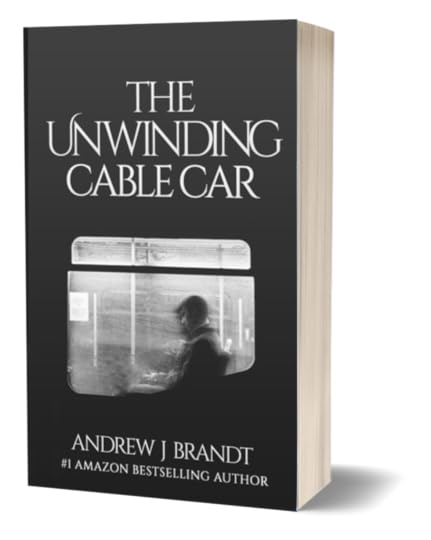
Below is the first chapter of my upcoming novel, The Unwinding Cable Car. It is available for preorder and will release Nov 17th wherever books are sold.
Pre-order Links:
Pre-order Autographed Paperback
“I’ve got to be honest with you, Hamilton,” the man behind the onyx black desk said. He sat, reclining as far back as the chrome-and-leather chair behind the desk would go, his hands interlaced behind his head of slicked-back black hair as he looked up at the ceiling, formulating his thoughts. A gold Rolex glinted in the harsh glare from the ceiling fixtures above. “It’s shit.”
“Oh, come on, Brad,” Hamilton argued, almost whining. “It’s better than complete shit.”
Hamilton Raines sat in his agent’s pristine office on the sixteenth floor of the First National Bank tower in downtown Dallas, the mid-afternoon sun starting to glare through the plate glass windows that lined the west wall. The light caused little rays and rainbows to bounce around the chrome and glass surfaces and little decorations that littered the place. In a few hours, Hamilton wanted to go escape all this light, go to the streets of downtown, maybe find a bar in Deep Ellum, listen to some music from one of the local bands and get tipsy, really tipsy. Until then, he was being berated by Brad Pascal, his agent of nearly five years.
He was thankful for Brad—most of the time. The no-nonsense, tell-it-like-it-is attitude that Brad employed was one of the things that made Hamilton choose the man over the other six agents that he had his choice of when he queried his first novel. But that was three books ago and now Hamilton Raines wanted a little coddling.
“I didn’t say complete shit,” Brad said, the light playing a weird dance off his glasses. He thumbed through the manuscript, stopping every few pages to review it.
“You’ve got a decent idea here, I think. But, the payoff, the ending, well, it needs some work. A lot of work.”
“What’s wrong with the ending?” Hamilton asked, his hands outstretched, the blazer he was wearing straining.
Endings, it turned out, were not Hamilton’s strong suit. After his first novel was accepted by a big publishing house, the promotional circuit initially made him out to be the next big thing. The next Harlan Coben. The next Gillian Flynn. Instead, the reviews trickled in and the industry excitement soured on Hamilton Raines. Despite the sales being far below what was initially expected, Hamilton wrote two more. They didn’t help, and he slowly saw less and less from each advance. The third book hadn’t even out-earned the advance yet. Unfortunately, the reviews all said the same, in just a different combination of words: Hamilton Raines’s endings suck. After all this time, all this work, his name would be just as anonymous as the countless other names on the shelves in Barnes and Noble.
The most gut-wrenching day of his life, the day Carol left nearly five months ago, was capped by making a late-night trip to the local dollar store for a gallon of milk and a bag of coffee and seeing one of his books in the bargain bin. The bargain bin at a dollar store!
“It’s not earned, Ham!” Brad exclaimed, mimicking the hands-out Christ pose. “I see where you want to go with the story, but the characters need more depth before they get to the end.”
“Well, what do you suggest?”
“Make them suffer,” Brad said. “Readers want to feel that before the big payoff. If this is the ending you want to get to, you need your characters to earn it. I have to tell you, Ham, I’m getting a lot of heat from the guys in New York. We expected big sales for the last one, man. I mean, Great Desperations was supposed to be a monster. A fucking monster!”
A monster that ended up in the bargain bin. “Well, this isn’t Great Desperations,” Hamilton said with a sigh. It was true, though. That book should have been the monster. It was his favorite, and what he thought was his best work yet.
The New York Times, however, gave it two-and-a-half stars.
“We need to deliver a monster, though,” Bad repeated the phrase, his favorite when discussing the books. A monster to him was the ever-elusive catch that seemed just out of grasp. “Know what I’m saying?” Brad was now leaning on his forearms on his desk, a MacBook closed and shoved to the side rested under his sleeve.
“I know, I know,” Hamilton relented. He stared out the window, the taste of cheap bourbon already calling for him. “I just really thought I had it with this one.”
“Well, like I said, it’s not complete shit,” Brad said as he flicked the corner of the pages with his thumb. The sound echoed through the office. “We’ve got something to work with here, at least in the first fifty thousand words. But the second half, it needs a lot of work before we even send it to the developmental editors. And I sure as shit don’t want to send this manuscript to New York in the state it’s in now. They’ll eat us alive, Ham.”
For all intents and purposes, Hamilton knew this book was it. His last shot with a big-name publisher. His contract was up after this one, and there’d been absolutely zero negotiation to renew or extend the deal for more books.
Brad looked at Hamilton with a sincere gaze. “Look, I believe in Hamilton Raines. I wanted you because I knew you had something special in you. We just haven’t cracked it yet.”
“Well, how do we crack it then? Because I thought this one was pretty good,” Hamilton said.
“I don’t know. What’s your routine like right now?”
Hamilton didn’t want to tell him the truth. He didn’t want to tell his agent that he’d, for a lack of better term, holed himself in his apartment, sleeping during the day and drinking during the night. He’d type away a thousand words—sometimes more—before crashing on the couch. His diet at this point consisted of deli meats and white bread and cheap booze.
After all, Rolling Rock was five dollars for a six pack down at the corner store.
“My routine? I generally write at night. Try to get a thousand words on the laptop.” Except a thousand words was a stretch. He’d finally been hit with the mythical dragon that all writers succumb to, the one thing that makes it all screech to a halt. Writer’s block.
He’d spent days on end staring at the blinking cursor on his screen. He’d type a few words, and then delete them. He’d type new ones and just stare at them. He’d rearrange them, walk away, come back and delete everything again. The story was there, in his brain, but he couldn’t seem to get it to flow out of his fingers and into the keyboard.
The weight of it all crashed on his shoulders as he knew that this was it. If he couldn’t deliver on this story, he’d be out on his ass, the contract ripped up, no more advances, no more books.
“You getting out much?” Brad’s voice pulled him from his thoughts.
“Well,” Hamilton stammered, chewing on the inside of his cheek. “I mean, I’ve been busy with this draft, and…” he trailed off.
“How’s Carol?” Brad pressed.
Hamilton looked away, the memory of that worst day coming back to his mind. “She left me, Brad. You know this.”
“And you’ve basically shut yourself up in that apartment then? I bet if I came to your place, I’d find nothing but empty beer cans and leftover sandwiches.”
Right on the money. Hamilton didn’t respond.
“Alright, this is what I want you to do. Get out of the apartment. It’s nice out this time of year. I want you to find a cafe, nothing too busy, one of the local joints, and get out of the apartment and write from there,” Brad said. “Some fresh air will do you some good.”
“I’m not some Instagram wannabe, Brad,” Hamilton scoffed. “Want me to take pictures of my coffee while I’m at it?”
“One of those Instagram wannabes just got a fifty thousand dollar advance from Grand Central Press,” Brad said. “You’ve got a lot of potential, and I want my ten percent. So, if that’s what it takes, do it.”
“That’s not me, though. I write thrillers, mysteries, dark shit. Not bubblegum love stories. I don’t write from a cafe,” Hamilton said.
“Look, just try it out. A change of scenery might be good for you.”
“Write from the cafe,” Hamilton sighed. He reached into his messenger bag at his feet and produced a black Leuchtturm1917 notebook. Hamilton had traditionally used it to collect his thoughts, to write down character ideas and to hash out plot points. It hadn’t been cracked open in quite some time. Like a security blanket though, he kept it with him. “Might as well flash this thing around so everyone around will know that I’m a bona fide writer. God, I'll be a walking stereotype, with my notebook and my latte.”
“Well, with some luck and some polish, this book will make you a rich walking stereotype,” Brad said with a wink.
“Yeah,” was all Hamilton could muster.
Brad Pascal chaperoned his client out the door, and a few minutes later, Hamilton was riding the elevator to the first floor of the high-rise building. Across the street, through the traffic of fourth street, he never noticed the little coffee shop tucked into the corner of the stone and glass building there. The metal sign above the facade read URBANA.
At one of the tables on the sidewalk outside the building, a young man sat in front of a large notebook, scribbling away with a rhythm that Hamilton recognized immediately. Dark hair falling over his brow, furrowed as he vigorously wrote, he wore all black, doing his best impression of a young Neil Gaiman. The furious scribbling without so much as looking up to sip from his iced coffee could mean only one thing—this young man, in a pair of slim-fit dark chinos and a black button-up with rolled sleeves, was writing.
A walking stereotype.
Checking the Kobold watch strapped to his wrist, Hamilton saw it was just after five. He figured, what the hell, he could go have a coffee and observe the atmosphere, take it in, see if it held any magic. If not, the bar in Deep Ellum was just a few blocks away.
Once the traffic cleared and he had a green cross signal, Hamilton jogged over to the coffee shop. He glanced over at the young man with the notebook and sure enough, he was writing paragraphs, dialogue.
He was writing a book.
Walking inside, the coffee shop had that roasted bean smell that was prevalent and somehow uniform amongst all the coffee shops he’d ever been in. High energy pop music swam out of ceiling-mounted speakers. A young lady in a green apron behind the counter greeted him warmly. Her purple and pink hair shone vibrantly, a physical manifestation of the hipsterness of this place.
There was no magic here, though. Nothing of this shop spoke to Hamilton Raines, or made him feel inspired. It was just a cookie-cutter coffee house, where a caffeinated hot chocolate or an iced macchiato could be had for five bucks. After perusing the menu, he ordered an iced vanilla latte, waited for it and took it back outside. With his drink in hand, he sat at one of the metal patio tables and just watched.
People were beginning to fill the streets, the rush hour beginning. Still, the young man with the notebook paid no attention to the bustle around them, sunk into his story. Hamilton envied him, envied that ability to get lost in a story as it was being written, leaking ink onto pages just to find out what happens next. This last novel had been a beating, a chore. There wasn’t much magic left in him. The thought of that scared him, too. He knew it as he was writing, he just didn’t feel it like he used to. At one point in time, he could do nothing but think of his stories. In the shower, he’d come up with dialogue, acting it out with Pantene in his hair. Now, writing a book was like pulling a tooth. It was work, and it sucked. And sometimes there was blood.
The young man with the floppy hair must have felt Hamilton’s eyes on him because he looked up from the open pages.
“Working on something good there?” Hamilton asked, hoping to sidestep any awkwardness.
“Oh,” the man said. “Yeah, something like that.”
“Are you a writer?”
“Well, kind of. I’m working on my first book,” he said.
Hamilton wanted to sidle up next to him and pour five years of pessimistic wisdom in his ear. Tell him that all the book would do in the end was break his heart. No one would buy it and it would end up in a discount bin.
Instead, Hamilton smiled. “That’s exciting. What’s it about?”
“It’s kind of a murder mystery. Three boys build a treehouse out in the woods and then discover a dead body,” the man said.
“Sounds intense,” Hamilton said.
“It’s a story idea I’ve had for a long time, I just finally feel like I have the inspiration to write it,” he said.
Hamilton knew that feeling. He would do anything to get it back, to feel that excited about a book again. The unfortunate thing about work is that it eventually becomes work.
“You always write by hand?” Hamilton asked.
The young man looked down at his notebook and nodded. “Yeah, I thought I’d try it the old-fashioned way. Something about a laptop, a Word document just felt...I don’t know.”
Hamilton finished the sentence, “Impersonal? Like it’s not real?”
“Yeah,” the kid said. “Plus, Neil Gaiman writes like this, by hand. I figured I’d give it a shot too.”
Bingo. Hamilton could point out the imitators a mile away.
“What’s your name? That way I can say ‘I ran into that guy before he was famous.’” Hamilton asked, nearly cringing at his own question. The young aspiring author lit up though.
“Well, my name is Jeremy, but I think I’ll use a pen name,” he said, tapping the side of his jaw with the butt end of the pen. “I was thinking J.A. Phillips.”
“I like it,” Hamilton said, sipping his iced coffee.
“What about you?” Jeremy “J.A.” Phillips asked.
“Hamilton. Hamilton Raines,” he answered.
The kid’s face went flush. “What?” he finally stammered out. “Are you serious?”
Hamilton just shrugged. “In the flesh.”
“Oh my god.” The kid slumped back in his chair. “You’re telling me I’ve been talking with Hamilton Raines this entire time?”
“Yeah. My agent’s office is in that building,” Hamilton thumbed behind him. “Thought I’d come down for a cup of coffee.”
The young man shut his notebook and rummaged through a canvas backpack at his feet. He produced a copy of Great Desperations. “This is my third time reading it,” he said, cradling it in his hands like a precious object. “It’s literally my favorite book of all time.” Then he looked up at Hamilton, hopeful yet embarrassed to ask, though Hamilton knew what question was coming.
“Will you sign it for me?”
Hamilton smiled. “Of course I will.” That was still his favorite part of writing. Despite how much the process and the business of it seemed to have drained him over the last five years since his first novel, he never tired of signing autographs.
Phillips got up from his table and crossed the patio to Hamilton, who pulled a Waterman fountain pen from the inside of his jacket. Taking the book from the kid’s hands, he felt the spine, the bent and broken corners, the way the pages fanned even when lying flat. The book had been well-loved. He cracked it open to the title page and scrawled his name in blue Waterman ink that flowed from the pen. Underneath, he wrote the inscription, “To J.A. Phillips, from your first fan.”
He handed the book back to the kid who beamed at the autograph.
“This is seriously the best day of my life,” he said.
Though Hamilton didn’t hear him. His attention was suddenly and completely drawn elsewhere.
Walking up the sidewalk and into the front doors of Urbana was a woman unlike any he’d ever seen in his life. Of course he’d seen beautiful women, had a few notches on the bedpost, but this woman in front of him seemingly glowed in a halo of light and beauty. Her long brown hair fell in ringlets that framed a perfectly round face. Her lips, plump and red, juxtaposed the cream color of her skin. Hamilton blinked once, twice, perhaps to shake himself from this enraptured seizure of his attention.
She looked at him, smiled, impossibly white teeth glinting in the happy hour sun and as she walked inside, no longer in his line of sight, the spell broke.
The kid’s voice brought him back to reality. “Anyway, thank you so much for this. It means the world to me.”
He looked up at the kid, who was still admiring the autographed page in his copy of Great Desperations.
“Oh,” Hamilton said. “Yeah, kid. Anytime.”
Grabbing his backpack, Phillips tossed both the newly-autographed book and his notebook in its large cavity. “Thank you again,” he said. “Maybe I’ll see you around here again sometime?”
“Yeah, maybe.” Probably not.
Hamilton got up to leave as well. He threw his drink, which was just water and ice stained with milk at this point, into the trashcan by the tables. It was time to head back home. He turned to the sidewalk and nearly ran face-first into the beautiful woman, who had come out the door.
“Oh my goodness,” she said, startled, juggling the drink in her hand so that it didn’t slosh all over the both of them. “I am so sorry.” Her voice was tinged with a hint of an accent that Hamilton couldn’t immediately place. Mediterranean, maybe?
“No, no, it’s my fault,” Hamilton said. “I wasn’t watching where I was going.”
Up close, she was even more beautiful. Not just beautiful—flawless. If he were to build his dream woman, she would look something like her.
“Do you know him?” she asked, nodding toward Phillips who was now a block down the sidewalk, waiting for a crossing signal to change.
Hamilton turned. “Oh, that kid? No. I just met him. Why?”
“I see him here often,” she said. “He is a writer. I thought maybe you were a friend of his.”
“No. I just found this place.” He was about to explain that he was a writer as well, that his agent had suggested he find a coffee house like this, but he didn’t want to come off as cocky. Instead, he said, “I need to get going myself. Enjoy your coffee.”
“Well, I hope to run into you again soon,” she said.
Hamilton didn’t know how to respond. It sounded flirty, and he liked it. The way she spoke, it made him feel like he still had it. “I hope so,” he finally said.
Walking back to the DART station that would take him back home, he couldn’t help but let his mind wander, to let his imagination come up with every sort of scenario involving this beautiful woman. It felt crazy, but he absolutely wanted to see her again.
July 10, 2020
My 5 favorite books of 2020 (so far)
Thanks to the COVID-19 pandemic, many of the things we've done in past years to take up our leisure time—going to the movies, watching sports, hanging out at the local brewery—have been either halted altogether or just now coming back. So, one thing I've had is a lot of time to read new books. Here's a list of my five favorite novels that have been released this year.
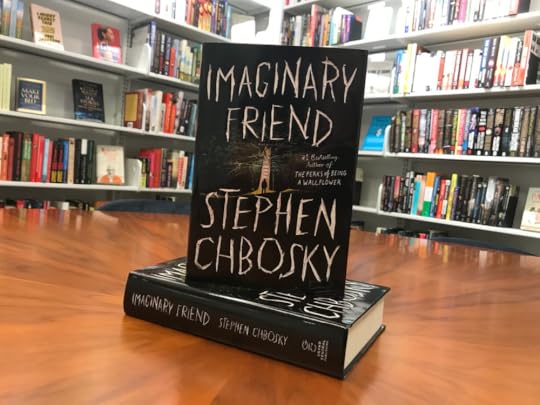
5. Imaginary Friend by Stephen Chbosky
The first novel I read this year was also the scariest. Imaginary Friend follows a group of boys who build a treehouse out in the woods...and then find a dead body. (I know, it sounds really familiar to me as well) Some crazy supernatural things happen, and the story takes shape in the final two hundred pages. One thing about Imaginary Friend is that, even though it's pants-shittingly scary, it's also really long. It's the complete opposite of Chbosky's first novel, the lovely Perks of Being a Wallflower, which was also really cool to see Chbosky flexing his storytelling muscles.
4. The Happy Ever After Playlist by Abby Jimenez
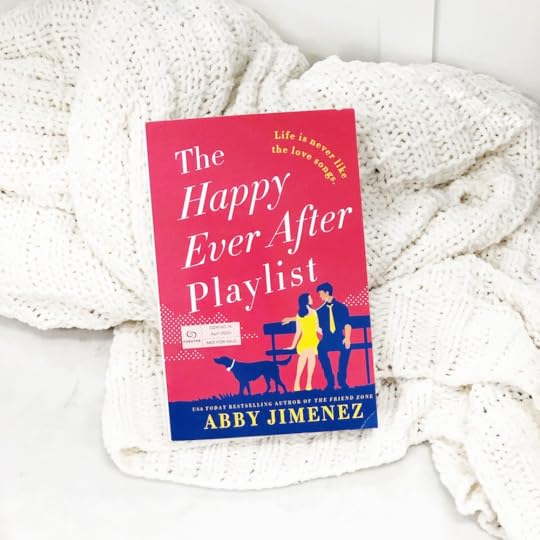
2020 is the year I discovered the romcom novel. There's a few on this list, but not the only ones I read this year. Abby Jimenez creates hilarious characters with wonderfully charming interactions but she also has this ability to rip your heart out of your chest, just to mend it back together for that happy ever after. THEAP is Jimenez's second novel and technically a follow-up to her debut (The Friend Zone, which I also read this year) though it follows two characters from the first book on their own romantic adventure. I loved all the references to music and the fun, flirty beginnings of the relationship that blossomed between Sloan and Jaxon. If you check this one out, you will need to read The Friend Zone first.
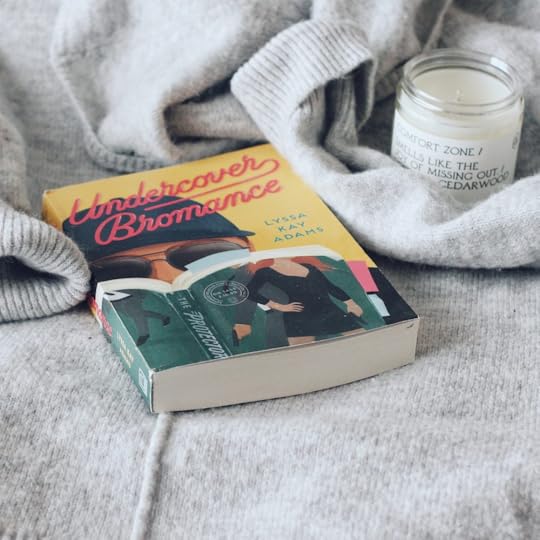
3.Undercover Bromance by Lyssa Kay Adams
Corollary: I actually enjoyed Adams' first Bromance book, The Bromance Book Club, more than Undercover, however this one came out this year. It was also the last physical book I purchased before we went into quarantine back in March. Lyssa Kay Adams writes hilarious character interactions and the Bromance Book Club guys have me rolling with laughter. This selection follows one of the book club members in a "friends-to-enemies" trope as he helps a waitress take down a celebrity chef in Nashville who she caught harassing another waitress. Though a heavy subject, especially post-#metoo, Lyssa adds a lot of brevity and fun to the story. Plus, lots of romance.
2. Let the Guilty Pay by Rick Treon
This book is really high on this list, and it's not just because I know Rick. LtGP is Texas noir, dirty
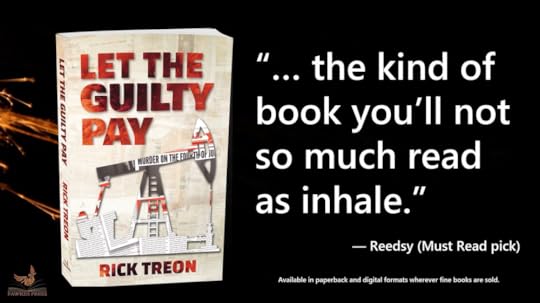
and full of mystery. It follows two timelines and two identical murders twenty years apart that Rick weaves with near perfection, a crashing crescendo that left me breathless with every turn of the page. Even if I didn't know Rick, even if I didn't read this as an ARC, it would still be incredibly high on this list because, simply, it's a damn good suspense thriller.
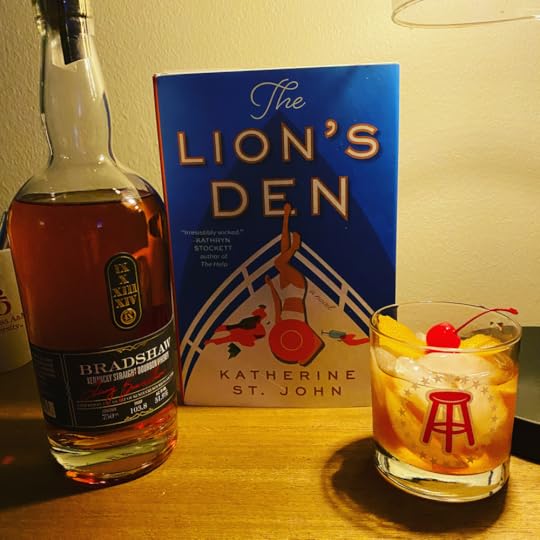
1. The Lion's Den by Katherine St. John
It may be a bit of recency bias that puts St. John's debut at #1 on this list, but it's also a really, really good thriller. I read this over the course of a week, and when I wasn't reading it, I was thinking about Isabelle and the ladies on the yacht. I love how little bits of information are shared with the reader and the entire picture is put together as the story climaxes (murder in the Mediterranean!) It's sort of like Mean Girls, except everyone is super rich and it's on a yacht.
May 5, 2020
WRITE WHAT YOU KNOW (RESEARCH WHAT YOU DON'T)
)Originally published on www.ricktreon.com on May 5th, 2020)
WRITE WHAT YOU KNOW

Then research the things you don’t.
I think Stephen King said it best in ,On Writing when he likened writing novels to digging up dinosaur bones. Sometimes you only find a hipbone and you have to craft a story around that little bit of imagination. Other times, it comes to you intact, the entire story and plot ready to be written. I’ve had a bit of both, but ,Palo Duro was one of the stories that came to me whole.
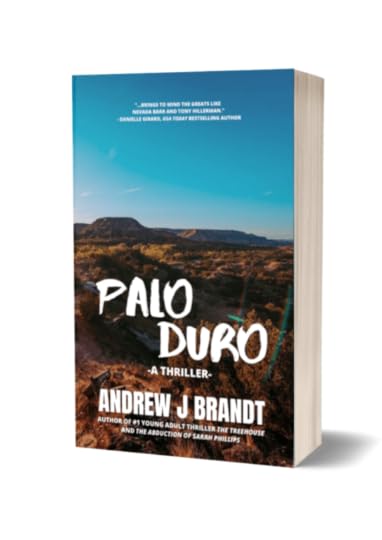
When it came to writing Palo Duro, I knew I wanted to do a couple of things. First, I wanted to write a love letter to the canyon, to West Texas A&M, and to the history of the Panhandle as a whole. My adopted home, this place has been an amazing area to “grow up” (I moved here when I was 18 to attend WTAMU).
Second, I wanted to write an adventure story like the kind I grew up with. Indiana Jones, Explorers — those eighties movies that were just fun adventures. Even though the story takes place in a modern-day setting, my goal was to infuse those nostalgic feelings into the story, to make the reader reminisce about those adventures.
I also knew that, with the subject matter, I would ask the reader to suspend their disbelief in the latter half of the book, which is why I did a ton of research for the procedural portion of the first half. You see, Palo Duro starts out as a missing persons procedural; namely, a young woman who goes missing while searching for Native American artifacts in the caves of Palo Duro Canyon. I knew I needed to get that part of the story right, to make it as factual as possible, because if the reader doesn’t believe the first half of the story, then they wouldn’t accept the second half.

-Post continues after this advertisement-
The old adage of writing is “write what you know,” but I, of course, have never been a State Park ranger, nor have I ever gone missing. So, the next best thing to real-life experience is research. I spoke with several law enforcement agencies (corollary: don’t be surprised by the looks you get from law enforcement when you start asking questions like, “How would someone go missing without a trace?” or “How would you fake evidence on a crime scene?”) including local police and Texas Parks & Wildlife officials on policies and procedures for missing persons cases in a rural, untamed area like PDC. They were helpful, of course, but my biggest source of information came from local media and journalists who were experienced in covering these kind of cases. Specifically, Niccole Caan from Amarillo’s ABC affiliate, KVII-TV, offered an immeasurable amount of information about the procedures during a missing persons story. It was actually Ms. Caan who informed me that search and rescue helicopters are provided by Texas Department of Public Safety and not county or city law enforcement.
Beyond that, I was able to (finally!) put my bachelor’s degree in Latin American history to use when sprinkling the history of the area into the story, and allowing that history to shape and flavor the story as a whole. So, in a sense, I really was able to “write what I know.”
February 26, 2020
A Sneak Peek at PALO DURO: A THRILLER
PROLOGUE
RACHEL HERNANDEZ KNEW she was in trouble. As the sun sank just below the horizon line, the night air cooling to the point that she had to zip up her orange down jacket to keep warm, she needed to head back to her vehicle as soon as possible. The last thing she wanted was to be out here on the trails after it got dark. In fact, if her brother found out she was out here alone—much less alone at this hour—he would tell her how stupid she was, probably loud enough for the entire campus to hear.
Rachel and Ricardo (Ricky, he preferred, though their mother always called him by his full name Ricardo Joseph Hernandez when he was in trouble) were twins, sophomores at West Texas A&M University, and like a lot of twins, they couldn’t be more different from one another. One was pragmatic and calculated, while the other was free-spirited with a head in the clouds and a penchant for imagination and exploration. With one of them alone in the canyon at dusk, searching for Native American artifacts, you can probably guess which was which.
Rachel, an anthropological student at the university was both fascinated by, and curious about, the ancient Native American civilizations that once inhabited the valley of Palo Duro Canyon, long before Francisco Coronado and the conquistadors traipsed all through the Texas panhandle in the 1500’s. In fact, it was her love of all things Native American that drove her to attend West Texas A&M in the first place. With Palo Duro Canyon just twenty miles from the campus, she spent most of her free time down here, usually with her roommate Jordan and a few other students in the anthropology program, searching for signs of ancient encampments and a civilization that was wiped out when the Europeans infiltrated the land.
The canyon carved into the otherwise flat Texas panhandle a hole nearly twenty miles wide at some points and almost a thousand feet deep. The elements had formed, over thousands of years, various formations that struck Rachel in wonder. From the sandstone hoodoos to the sheer cliffs cut by millions of years of weather and change, the whole thing fascinated her. And while she loved to spend time down here in “the Grand Canyon of Texas,” her brother spent most of his time in the computer lab.
It never ceased to amaze Rachel—two kids from the same parents, same genes, who couldn’t be more identical, were complete opposites. In fact, she had found him in the I.T. lab before she drove to the canyon earlier that morning. He was working on some piece of equipment that she had no idea what it did, and with his hands in the guts of this machine, she had told him, voice full of wonder and eyes wide with imagination, what she was going to look for.
“Somewhere in the caves there are ancient dwellings,” she had said. “From when the Kiowa lived in the canyon, before Coronado arrived. They were driven out by other tribes later, but allegedly, there’s still some dwellings where the paintings and carvings haven’t been altered. I was down there last week and I found a new entrance to the cave system. I think that’s where they are.”
Ricky had kind of hhhhmph’ed as he soldered together the components of the strange device.
“Are you even listening?” she asked him, perturbed.
“Mmmhmm,” he said, preoccupied, his eyes never coming up from the device. Strands of his long hair coming loose from behind his ear fell into his line of sight and he pushed it back. “Cave dwellings.”
“Right! Does that not excite you? Can you imagine what kind of history is there, just waiting to be discovered? Dr. Errington said she’s been looking for them for twenty years,” she said, her voice quickening as she paced the laboratory floor. “And, look,” Rachel produced a map, photocopied from a handwritten original that looked like it was several centuries old. “According to this, those caves are close to an ancient landslide, hidden by some boulders. Hard to access, easy to defend from attackers. I overlaid a present-day map over this, and it’s on some private land, near the boulder garden trail.”
“That’s great, but do you know what excites me, Rach?” he said as he clapped his hands together and stood back from his device. “This.” He pushed a button on the thing and it hummed to life. Suddenly, the sounds of the band Snow Patrol came from multiple speakers mounted on the workbench in the room.
“Music?” she asked, confused.
“Not just music, Rach. Check it out. This Linux server can stream the same source to multiple speakers. Whole-dorm audio,” Ricky said. On a control panel on the front of the computer’s casing, he flipped a dial and the song changed to another.
“You already have Bluetooth speakers,” Rachel said, rolling her eyes. This electronic tinkering, spending countless hours surrounded by countless pieces of technology, was not anything new. Rachel would go absolutely stir-crazy being indoors as much as Ricky was as he worked on these various projects. There was too much beauty and wonder and majesty outside for her to be cooped up all day in some electronic laboratory.
“This isn’t just regular Bluetooth. Pull out your phone,” Ricky said, and she obliged. “Now, open up your music. You should see an icon at the bottom of the screen for Bluetooth play. Click it.”
Rachel selected a song and then selected this new icon at the bottom of her screen. “It’s not doing anything,” she said. “Your machine doesn’t work.” The last two words were succinct and almost sarcastic.
“That’s what you don’t get,” Ricky said. “It’s a multi-device jukebox. We can put this in the dorm and anyone can attach their own speakers to the network and then play whatever they want, and it all goes into a queue. It’s open-source radio! Everyone gets to create a never-ending playlist and you can attach your phone and your own speaker to the mesh.”
“Oh wow,” Rachel said. “That is kind of...cool.”
“See? I can be cool sometimes,” he said with a smile.
Rachel laughed. “No, I said this,” she pointed at the device, “is cool. You still have a long way to go.”
“So is your roommate—what’s her name?”
“Jordan,” Rachel cut him off. He didn’t have to pretend to be ignorant; he knew exactly what her name was. Rachel had caught her brother staring at her roommate multiple times. She knew—but wouldn’t admit that she knew—her brother had a crush on Jordan. She also knew that it had been love at first sight for him.
“Right. Jordan. Is she going with you?” On the workbench, Ricky pulled a monitor that hung on a wall-mounted arm in front of him and started typing. Lines of code, none of it intelligible to Rachel, blurred on the screen.
“Um, yeah,” she lied.
“Good. You know mom doesn’t like it when you go down there by yourself,” Ricky said.
“Well, I’m not. And even if I was, Mom doesn’t have to know. Besides, I won’t be gone long.” She looked at her wristwatch, a Timex Expedition she’d received as a birthday gift from their mother a few years ago. The back had an inscription, etched into the stainless steel. Not all who wander are lost it read. The luminescent hands on the dial, glowing in the low light of the tech lab, read a quarter past three. “I’m going to take a few pictures once I get to the caves and come right back.”
“Alright,” he said warily. “Be careful. There’s Sasquatches down there.”
“Oh my god, Ricky,” she said. “There’s no such thing as a damn Sasquatch.”
And with that she had left the lab, went to her car, and drove down to the canyon. Now, nearly five hours later, she found herself off the main trails, the sun quickly going down. She knew Ricky would throw a fit. He’d probably even tell their mother that she was down there, if he hadn’t already. Despite being nineteen years old, she still felt like a little girl in her mother’s eyes.
Now she whacked her way through the brush, trying to find the trail that would take her back to the trailhead parking lot. She had just been on it, the little dirt path that cut through the mesquite brush. How had she wandered off of it? Despite her hurry, she felt an immense satisfaction with the day trip. She’d found the caves. Hundreds of paintings, depictions of ancient Native life, adorned the walls. She thought they’d be worn over time, of course, but, no. They were still there in all their black and gold glory and as if they’d been etched that very day. She had taken several pictures and written down the coordinates of the cave in her black Moleskine notebook. Doctor Errington, the head of the anthropology department, would be so excited when she’d show her what she’d found. Who even knew when the last time it was that a human actually laid eyes on these cave paintings?
Turning around a large bush, something caught her attention. As the bushes rustled ahead of her, she turned on her light and saw the hulking figure in the brush. It was a bison, no more than forty yards ahead of her. She couldn’t believe it. Taking out her phone, she snapped a couple of pictures of the creature as it grazed on some grass, seemingly paying the girl no mind. Rachel couldn’t wait to show Dr. Errington and Jordan all the pictures from this day trip. Even still, she couldn’t wait to bring them back down and show them, in person, all that she’d found.
Off in the distance, past the grazing bison, smoke softly billowed above the mesquite brush from an encampment a few hundred yards ahead of her. She realized that it was now almost completely dark. The sun had set faster than she’d anticipated and the encampment was lit by fires, a soft orange glow illuminating the encampment. From here, she could make out four tents poking above the canyon floor, cutting into the quickly-darkening sky.
Rachel knew there were backpacking and primitive campsites in the canyon, but they were generally further down the river that ran through the canyon, on the south side of the state park. This didn’t look like a primitive campsite, however. In fact, as she observed the encampment through the brush, she saw several more tents a little further back, their tops peeking through the brush.
She took out her phone and began taking photographs, zooming in on the encampment. It was unlike anything she’d ever seen, but also so familiar. Rachel realized what she was seeing—they weren’t tents, but teepees. She’d never seen historically-authentic teepees in person before out in the wilderness. She wondered if there was a historical reenactment event going on.
Before she had time to react, a sound, the crunching of branches on dirt, from behind startled her. In her fascination, Rachel never saw the person come up behind her. She felt a pair of strong hands wrap around her mouth and she tried to scream, tried to kick, but multiple arms were around her now as she was dragged off the trail and into the night.
Pre-order PALO DURO: A THRILLER today! Available in ebook ($5.99) and paperback ($14.99).
